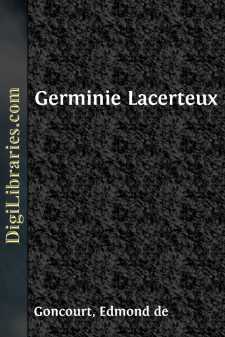Categories
- Antiques & Collectibles 13
- Architecture 36
- Art 48
- Bibles 22
- Biography & Autobiography 813
- Body, Mind & Spirit 142
- Business & Economics 28
- Children's Books 15
- Children's Fiction 12
- Computers 4
- Cooking 94
- Crafts & Hobbies 4
- Drama 346
- Education 46
- Family & Relationships 57
- Fiction 11828
- Games 19
- Gardening 17
- Health & Fitness 34
- History 1377
- House & Home 1
- Humor 147
- Juvenile Fiction 1873
- Juvenile Nonfiction 202
- Language Arts & Disciplines 88
- Law 16
- Literary Collections 686
- Literary Criticism 179
- Mathematics 13
- Medical 41
- Music 40
- Nature 179
- Non-Classifiable 1768
- Performing Arts 7
- Periodicals 1453
- Philosophy 64
- Photography 2
- Poetry 896
- Political Science 203
- Psychology 42
- Reference 154
- Religion 513
- Science 126
- Self-Help 84
- Social Science 81
- Sports & Recreation 34
- Study Aids 3
- Technology & Engineering 59
- Transportation 23
- Travel 463
- True Crime 29
Germinie Lacerteux
Categories:
Description:
Excerpt
We must ask pardon of the public for offering it this book, and give it due warning of what it will find therein.
The public loves fictitious novels! this is a true novel.
It loves books which make a pretence of introducing their readers to fashionable society: this book deals with the life of the street.
It loves little indecent books, memoirs of courtesans, alcove confessions, erotic obscenity, the scandal tucked away in pictures in a bookseller's shop window: that which is contained in the following pages is rigidly clean and pure. Do not expect the photograph of Pleasure décolletée: the following study is the clinic of Love.
Again, the public loves to read pleasant, soothing stories, adventures that end happily, imaginative works that disturb neither its digestion nor its peace of mind: this book furnishes entertainment of a melancholy, violent sort calculated to disarrange the habits and injure the health of the public.
Why then have we written it? For no other purpose than to annoy the public and offend its tastes?
By no means.
Living as we do in the nineteenth century, in an age of universal suffrage, of democracy, of liberalism, we asked ourselves the question whether what are called "the lower classes" had no rights in the novel; if that world beneath a world, the common people, must needs remain subject to the literary interdict, and helpless against the contempt of authors who have hitherto said no word to imply that the common people possess a heart and soul. We asked ourselves whether, in these days of equality in which we live, there are classes unworthy the notice of the author and the reader, misfortunes too lowly, dramas too foul-mouthed, catastrophes too commonplace in the terror they inspire. We were curious to know if that conventional symbol of a forgotten literature, of a vanished society, Tragedy, is definitely dead; if, in a country where castes no longer exist and aristocracy has no legal status, the miseries of the lowly and the poor would appeal to public interest, emotion, compassion, as forcibly as the miseries of the great and the rich; if, in a word, the tears that are shed in low life have the same power to cause tears to flow as the tears shed in high life.
These thoughts led us to venture upon the humble tale, Sœur Philomène, in 1861; they lead us to put forth Germinie Lacerteux to-day.
Now, let the book be spoken slightingly of; it matters little. At this day, when the sphere of the Novel is broadening and expanding, when it is beginning to be the serious, impassioned, living form of literary study and social investigation, when it is becoming, by virtue of analysis and psychological research, the true History of contemporary morals, when the novel has taken its place among the necessary elements of knowledge, it may properly demand its liberty and freedom of speech. And to encourage it in the search for Art and Truth, to authorize it to disclose misery and suffering which it is not well for the fortunate people of Paris to forget, and to show to people of fashion what the Sisters of Charity have the courage to see for themselves, what the queens of old compelled their children to touch with their eyes in the hospitals: the visible, palpitating human suffering that teaches charity; to confirm the novel in the practice of that religion which the last century called by the vast and far-reaching name, Humanity:—it needs no other warrant than the consciousness that that is its right....



